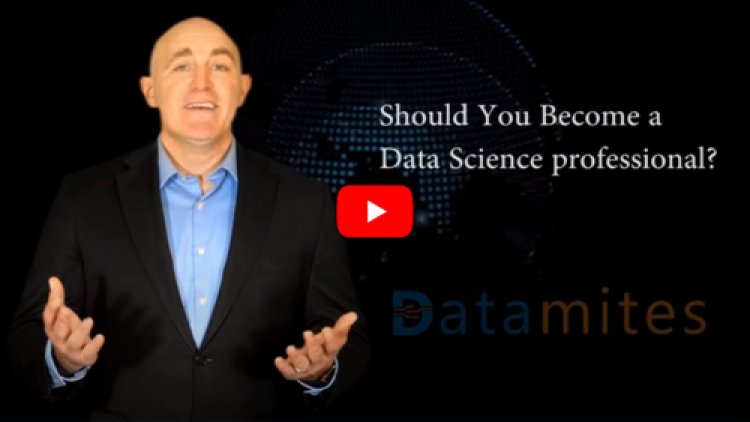How To Become A Data Scientist?
Becoming a data scientist involves building a strong foundation in math, statistics, and programming, along with hands-on experience in data analysis and machine learning. This guide walks you through the essential steps, skills, and tools needed to start your journey.

In an age driven by data, businesses across every industry, from healthcare to finance, e-commerce to entertainment, rely on informed insights to make smarter decisions. At the heart of this transformation is a dynamic role: the Data Scientist. As the demand for data science continues to surge, more people are asking, “How to be a data scientist?”
According to the U.S. Bureau of Labor Statistics, data science roles are expected to grow by 36% through 2033, significantly outpacing average job growth across industries. This booming field not only offers excellent salary prospects but also provides a platform to work on innovative and impactful projects.
Whether you are a student, a professional considering a career change, or simply interested in the field, this guide covers all the essentials of a data science career, including how to become a data scientist, the key skills required, and insights into the future of the industry.
What Does a Data Scientist Actually Do?
A data scientist is a problem solver who uses data to help organizations make smarter decisions. They combine statistics, programming, and domain knowledge to uncover patterns, build predictive models, and deliver actionable insights.
Key Responsibilities of a Data Scientist:
- Collecting & Cleaning Data: Preparing datasets using tools like Python, R, SQL
- Analyzing Data: Performing statistical analysis and exploratory data analysis (EDA)
- Model Building: Creating machine learning models for prediction or classification
- Visualization: Presenting insights through dashboards using Tableau or Matplotlib
- Communication: Explaining complex results to non-technical stakeholders
These tasks are central to various applications of data science, such as fraud detection, customer behavior analysis, demand forecasting, and more.
By mastering these tasks with the right data science tools and guidance from a top data science institute, you can build a strong career in data science.
Why Become a Data Scientist?
The question isn't just how to become a data scientist, but why?
1. High Demand and Lucrative Salaries
The demand for data science professionals is soaring. LinkedIn has ranked "Data Scientist" among the top 10 most in-demand jobs for several years. Entry-level salaries in the U.S. average over $95,000, with senior roles reaching $160,000+. In India, AmbitionBox reports salaries ranging from ₹4 Lakhs to ₹29.8 Lakhs annually, highlighting strong global earning potential in this field.
2. Versatile Career Paths
You can build a career in data science in virtually any industry:
- Healthcare: Predict disease outbreaks
- Finance: Model credit risk
- Marketing: Personalize user experience
- Retail: Optimize inventory and pricing strategies
These vast applications of data science make it an exciting and future-proof career.
3. Innovation & Impact
If you enjoy solving real-world problems using logic and creativity, then the data science career is your playground. You get to work on impactful projects that shape product decisions and influence customer experience.
4. Wide Scope and Future Potential
The scope of data science is only expanding. With the rise of AI, IoT, and cloud computing, the future of data science is not only secure but brimming with possibilities. Whether it’s space exploration or personalized medicine, data scientists will be key players.
Essential Tools and Skills for Data Scientists
To succeed in a career in data science, mastering both the right tools and a solid skill set is essential. Whether you're just starting with a data science course, these are the foundational elements you'll need to become job-ready.
Core Data Science Tools:
These data science tools help you manipulate data, build models, and create impactful visualizations:
- Python & R – Widely used programming languages for data analysis and machine learning
- SQL – Essential for querying databases and handling structured data
- Pandas & NumPy – Python libraries for data manipulation and numerical computation
- Scikit-learn & TensorFlow – Powerful frameworks for building machine learning models
- Tableau, Power BI & Matplotlib – Visualization tools for making insights easy to understand
- Jupyter Notebooks – Interactive environment for writing and sharing data science code
- Apache Spark & Hadoop – Big data tools for handling large-scale datasets
These are commonly taught in both online and offline data science courses, especially by the best data science institutes.
Key Skills in Data Science:
Beyond tools, here are the core data science skills you need to develop:
- Statistical Analysis & Probability – Understand data behavior and trends
- Data Wrangling – Cleaning messy datasets to make them analysis-ready
- Machine Learning Algorithms – Supervised and unsupervised learning models
- Data Visualization – Converting numbers into compelling visual stories
- Critical Thinking – Framing problems and interpreting results correctly
- Communication Skills – Presenting insights to stakeholders clearly
If you're looking to strengthen these skills in data science, enrolling in a hands-on training program from a top data science institute is a great step.
How to Become a Data Scientist: Step-by-Step Guide
Now let’s explore the actionable steps to become a data scientist. This structured approach caters to both beginners and professionals.
Step 1: Build a Strong Foundation
Start with core programming skills in Python or R. Learn data structures, functions, and basic coding concepts. This technical base is essential for building strong skills in data science.
Step 2: Learn Math and Statistics
Math & Statistics for Data Science are critical foundations for any data science career. A strong grasp of statistics and probability—especially topics like distributions, p-values, linear regression, and hypothesis testing—enables you to interpret data effectively and build powerful models.
Step 3: Master Data Manipulation and Visualization
Use tools like Pandas, NumPy, and Matplotlib to clean and explore data. Visualization helps you uncover insights and is essential in many applications of data science.
Step 4: Learn Machine Learning
Study algorithms such as decision trees, random forests, and neural networks using Scikit-learn and TensorFlow. These are core components of modern data science tools used in real-world projects.
Step 5: Build Projects and a Portfolio
Apply your knowledge by working on real datasets. Publish projects on GitHub and share them on LinkedIn. A strong portfolio demonstrates your practical data science skills and problem-solving ability.
Step 6: Join a Data Science Training Program
A structured data science training program, whether online or offline can provide mentorship, hands-on projects, and valuable career support. When choosing a course, look for institutes with strong reviews, practical curriculum, and proven student outcomes.
Step 7: Get Real-World Experience
Gain hands-on experience through internships, freelance work, or volunteering. Real-world exposure helps bridge the gap between theory and practice and expands your understanding of the scope of data science.
Step 8: Prepare for Interviews
Practice SQL queries, coding challenges, and ML concepts. Prepare to discuss your portfolio and solve real business problems. Many data science courses offer interview prep and placement help.
Becoming a data scientist may seem challenging, but with the right roadmap, it’s entirely achievable. As demand for data-driven insights grows across industries, there’s never been a better time to enter this high-impact field. Whether you're a student starting out or a professional looking to pivot, the opportunities in data science are vast and rewarding.
According to Forbes and Statista, the global big data market is projected to reach $103 billion by 2027, with data science and analytics platforms expected to hit $25.9 billion. By building core skills, mastering essential tools, and enrolling in structured training, you can launch a successful data science career. Staying current with evolving trends will help you stay competitive and future-ready in this rapidly growing domain.
If you're considering a career in data science, there's no better time to begin. Enrolling in a data science institute in Ahmedabad, Bangalore, Chennai, Pune, Coimbatore, or Mumbai can provide you with essential skills, practical projects, and job placement support. With applications ranging from fraud detection to algorithmic trading, data science is rapidly transforming the financial industry, making it one of the most exciting and future-ready fields today.
Among the leading institutes driving innovation in data science education, DataMites Institute stands out as a top choice for aspiring professionals. Known for its industry-aligned curriculum and hands-on learning approach, DataMites offers real-time internship opportunities that bridge the gap between classroom learning and real-world application.
DataMites Certified Data Scientist programs are accredited by IABAC and NASSCOM FutureSkills, ensuring learners gain in-depth experience with core data science tools, machine learning techniques, and advanced analytics, skills that are highly sought after in finance and beyond.
For those seeking an in-person experience, DataMites Institute provides offline data science courses in Bangalore, Pune, Chennai, Hyderabad, Ahmedabad, Coimbatore, and Mumbai. They also cater to a global audience through flexible online programs, making high-quality data science training accessible regardless of location.

